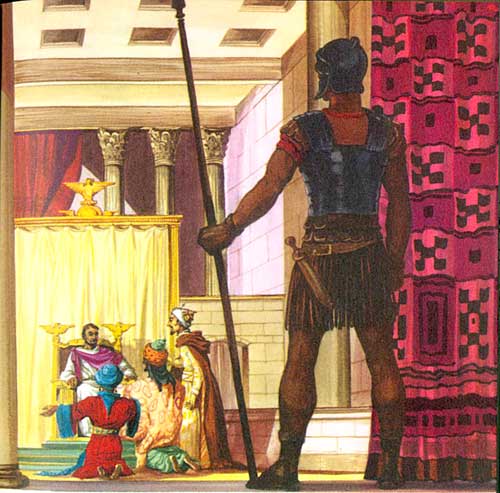First Sunday after the Epiphany, Year C
Holy Baptism: January
10, 2013
Isaiah 43:1-7
Ps. 29
Ps. 29
Acts 8:14-17
Luke
3:15-17, 21-22
Today we are hearing some news that is both very new and
very old. In our Gospel story, Jesus comes up to John, so he can be baptized in
the Jordan River. This is something very new. Jesus is not there to “repent of
his sins.” Jesus does not do this to join a new religion. There is an
astounding rush of a mighty wind. The Holy Spirit comes down over Jesus’ head
and a heavenly voice booms out, “You are my Son, the Beloved; with you I am
well pleased.”
When Jesus joined that throng of people coming to John to be
baptized, we can imagine that he, like them, was longing for something powerful
to happen. They were a group of people who wanted to turn their lives around,
and who believed that the whole world could turn around: they were filled with
expectation, Luke tells us. For them to want “the Messiah” is to want a world
in which God’s justice reigns, where families and communities are whole and
prosperous, where there is enough of everything to go around, a world full of
hope that the future will be better than the past. When the people – Jesus
included – came to be baptized, it was not just about themselves, alone: they
were coming to be part of a community, to be part of a new world, to be part of
the world that God had always promised was the way things would be.
Luke, unlike the other gospels, gives us some stories about
Jesus’ childhood and youth. Luke tells the story of Mary and Joseph taking
Jesus to be blessed in the Temple, and how people there recognized him as the
promised one who would bring about God’s reign. Luke also tells the story of
Jesus as an older child on another trip to the
Temple, where he leaves his parents and sits and talks with the scholars and
teachers, strong and confident, even as a child, about his place in God’s
world. These stories give us a hint that in this story, as Jesus comes to be
baptized, and lingers and prays by the river, that he is not surprised when
God’s voice, proclaiming him “the Beloved,” booms out from heaven. Jesus knows
that he has a place in this world, and a role to pay, in making this world the
beloved and blessed place God intended it to be.
.jpg) I said before that this story is about new news and old news.
God has always loved this world, and this is the old news about baptism: when
we are “marked as Christ’s own forever” it means that we should remember each
day who we are, and whose we are, and who we are called to be. And every day,
especially on those days when things get difficult, don’t each of us long to
hear those words, that we are beloved? That God has loved us from the beginning
of time, just as our mothers and fathers and friends have loved us, and just as
we love them back?
I said before that this story is about new news and old news.
God has always loved this world, and this is the old news about baptism: when
we are “marked as Christ’s own forever” it means that we should remember each
day who we are, and whose we are, and who we are called to be. And every day,
especially on those days when things get difficult, don’t each of us long to
hear those words, that we are beloved? That God has loved us from the beginning
of time, just as our mothers and fathers and friends have loved us, and just as
we love them back?
Our first reading today is one that Jesus himself knew. The
prophet Isaiah tells the story of that old news: that God has created us, that
God sticks by us in difficult times, and that God wants everyone, all sons and
daughters, to come home – to come from the ends of the earth to this party,
here, in this place, here in the heart of God. In a few minutes, when we
pour water on your head, as Jesus had water poured on his, you will know the
old truth: that you belong to God, and God loves you. With this baptism, as
with all baptisms, God is saying to each of us, "No matter what happens
and no matter how low and discouraged you feel, no matter what is happening
around you and in your life, don't you ever let anyone tell you that you
are anything but a precious and beloved child of God."[1]
So today, this party is about you, and about how happy
we are that you found us. And this party today is about all of you, children here for "First Communion," to take communion together, and how you understand how
beloved you are by God. You all are here today to teach the rest of us
something so very important: Baptism connects us. It ties us together as a
community. We are so much more than a collection of individuals, making our own
way, struggling alone with our own burdens. You being here today, taking
communion together as a group, are showing us that we are part of something
much greater than ourselves, that we are part of a community engaged with God
in the transformation of the world – that we, like Jesus, are standing here in
this mighty stream of people who from the beginning of time, have worked with
God to make this world the blessed and beloved place that God created it to be.
[1]
Kathryn Matthews Huey, Sermon Seeds Year
C (Pilgrim Press, 2012), p. 45


.jpg)
